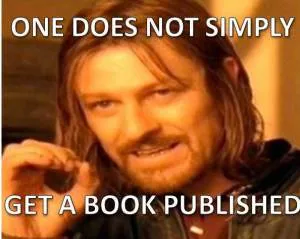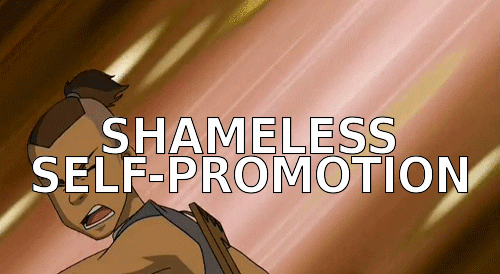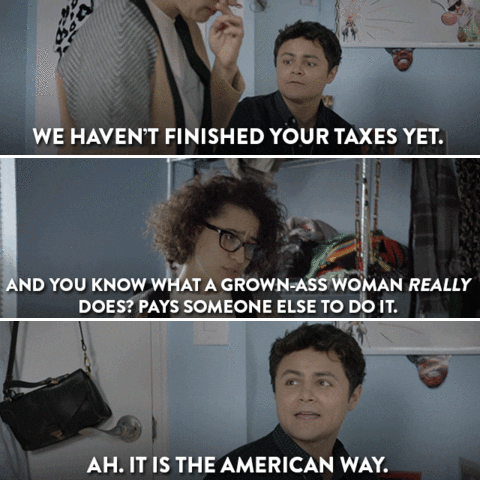
At one point, E.L. James was making over a million dollars a day off Fifty Shades of Grey. Her background was largely in marketing and writing fanfiction.
Dewey: A Small Town, a Library and the World's Most Beloved Cat scored a 7-figure advance off the success of Marley & Me, and the cat doesn’t even die. The author, Vicki Myron, was a small town librarian who found a kitten in the book return slot.
So you might think, “Hey, why not me?”
Let’s Talk About Advances
First, let’s talk about what exactly an advance is as it pertains to publishing. Let’s say that either you get accepted by a publisher, or your agent comes through and gets back to you with an offer. That’s what an advance initially is, after all, an offer. It doesn’t mean anything until you sign the dotted line and commit the rights to your book to the publisher, whether it’s a New York publisher, a small press, an ePress, or publishing on Amazon, though only a major publisher is likely to offer an advance.
“Vaughn? You haven’t explained what an advance is, yet, but I like the idea of 7 figures!” We all like the idea of 7 figures, as I imagine you’d comment, but the first thing you have to consider is that if a publisher offers you a 6 figure advance, you get that up front, yes, but it’s not free money. In the case of fiction, it’s money to get you through the time needed to prep the manuscript for publication through edits and revisions without being terrified of starving to death. With non-fiction, it’s often money to support you while you’re writing the book that you proposed to them, getting it ready for publication, and the like. But it’s not free money.
If you asked for an advance at your day job, what does that mean? You normally make 250 a week, and you ask for an advance of 2000. That’s eight weeks pay you now owe your workplace, which means there’ll be seven weeks where you’re “working for free”. In the case of a book advance?
Let’s say you get offered $100,000 as an advance. You take it, because dolla-dolla, and bust your butt getting your book ready for publication. Your book debuts, and readers are free to start buying it now, and they do! 😊
Fun With Math!
Now we start getting into the money of it all. Let’s say that your book is put out in hardcover, because you’re a serious author and first print runs are usually hardcover. It’s priced at $19.99 USD by Amazon, with Prime Shipping available.
Royalties are often processed monthly, but can take up to 90 days before booksellers begin supplying data. As it’s a hardcover, it might take 120 days. But, it’s $20, essentially, maybe $25 at a brick and mortar, but we’ll stick with $20 for the ease of division. Typical markup by the seller is usually around 40%, so Amazon, in this case, is buying your book for $12 and selling it for $20, making an $8 profit every time a reader buys a copy. There was 100% at first, and Amazon took 40 of it. Now the publisher takes its share. How much do they get? Amazon got 40. They get 50. Of the $20 the reader put down? At first, the publisher gets $10.
“Wait… I’m doing some math. It sells for $20… and I get $2? But… I WROTE IT!” I glad to imagine your frustration, but first, answer this question: Do you have a book press? Do you have editors on staff? Do you have developed, trusted connections with booksellers? Do you have connections to a marketing firm, or a top-flight in-house marketing team? Do you have access to a skilled cover artist that won’t demand a cut of the royalties? Do you have the infrastructure in place to go worldwide? Do you have the trust of millions of customers and a user friendly storefront service?
No. You don’t. So you get $2.
The Plight of Earning Out
So, let’s say in the first month, usually the biggest month for a book, 3k copies get sold. Awesome, right? Knowing that three thousand people are reading your book and paid money to do so feels fantastic. Plus, that $2 a book means you’re pulling in $6k! Kick ass, right? Bust out the champagne, champ!

“Vaughn? Why do I sense the other shoe’s about to drop?” Glad I imagined you asked.
Remember that $100k the publisher gave you? Yeah, they didn’t forget about that. An advance? That’s a loan against your future book sales. That $6k you pulled? That goes to the publisher. Well… actually, did you get an agent?
If you did, that’s probably how you got that advance in the first place, so don’t be mad at them. You went with them to get your dolla-dolla and they came through. And they’re taking their cut. 15%. That $100k? They got $15k of that. Your $6k in royalties? They get $900 of that. The rest? That goes to the publisher. Before you get angry and fire your agent? If you went it alone you likely wouldn’t be pulling a third of what you’re getting at this point in the scenario, so your agent earned their 15%.

In either case, you’ve paid back about 5% of your advance. You still owe the rest of that before you’ll start seeing any royalties personally. Now, your royalty percentage can go up if the sales figures increase. So, let’s say after ten months, you’ve sold 10,000 copies. This is usually when your publisher bumps your royalty share.
But again, you’re not seeing any checks until your royalties pay off your advance, or you “earn out”. How many authors earn out? Not that many, actually. Unless you hit the zeitgeist bingo, it can take years, or just won’t ever happen. So what happens when you don’t earn out? Well, you don’t have to pay back the advance, but the publisher might not want to work with you anymore, or if they do, it’ll be a much smaller advance. There are agents who recommend taking smaller advances as it significantly lowers the pressure to earn out, and can make the publisher more likely to up the offer next time if you earn out quickly.
Going Small
So, can you ask for less as an advance? Of course! A publisher rarely has a problem with you declining some or all of the advance, meaning you’ll earn out faster or start seeing royalties instantly. Or, if you went with a smaller press, or ePress you likely didn’t get any advance, or it was especially low. This doesn’t mean you should immediately go with a small press for quicker royalties, as smaller and ePresses have their drawbacks as well, as does self-publishing. You’ll see royalties faster, yes, but it’s dependent on marketing, which will be mostly on your own shoulders. No pressure to earn out, just pressure to sell the F--- out of your book like it’s your full-time job. Because it will be.
Web-Based is the Future!...right?
It used to be that if a new book came out that everyone was waiting for, you’d either have to wait in line, put it on reserve at the library, or pre-order with the hopes it’d arrive before spoilers ruined it for you. Now? Grumble after waking up, fumble around for your phone, tap it a few times, and just buy the damned eBook without ever getting out of bed or making yourself presentable for public view, and read it after you feel closer to human. That’s the dream.
Cutting Out the Middleman with E-Books!
So you decided to go with an ePress, because your book would be released sooner and start earning quicker. There’s no “Oh, honey…” moment here, it is a legitimate reason to go with an electronic press. An ePress has their own editorial staff, cover artists, and connections to reviewers and multiple outlets that sell eBooks besides Amazon. Most of the marketing burden is still on your shoulders, but you’re not all alone. How does it work, largely?

Let’s go to our previous example. Instead of a hardcover selling for $20 USD, since they don’t have to make the actual book, the price drops to $9 USD. Again, we’ll be using Amazon as an example. Amazon, in this case, is merely providing the platform. They aren’t storing your book, or putting it in the mail, just generating download links for buyers, so it’s not as much strain on them. Of that $9, Amazon takes $2. A lot less, right? This leaves $7. The publisher takes $4, and you get $3, unless you sell big, then those numbers are switched.
Now, with an electronic press, agents are rarely involved, so let’s say you have a good month, and 2000 people download your book. Notice that I emphasized download, because you’ll have to deal with piracy at this end of the pool and you will never be able to penetrate an e-pirate’s rationalizations for why they feel they don’t have to pay for your book. Piracy isn’t nearly as bad as some think, but of those 2000 downloads, the piracy percentage will usually be between 5-25% depending on how popular and known you are. The only thing that really deters piracy? Human laziness. It’s easier to just tap your phone a few times than scour the net for an hour and a half for a virus-free copy of an eBook to save a few bucks.
But let’s be optimistic and set the number at 5% for piracy. That’s still 1900 sells, or $5700 in royalties, and it’s all for you! No sharing! Bust out the champagne, champ! 😊

“Dammit, Vaughn. The shoe’s going to drop again, isn’t it?” Probably, yes.
I’m not going to tell you that you’re not going to have E.L. James levels of sales.
But yeah, you’re probably not going to have E.L. James levels of sales. The joke among writers is, “I used to say that I wanted to be published so much, I’d do it for free. I didn’t think my publisher actually took me seriously.” The first royalty check for a sold eBook will often, if you’re lucky, get the cash for a pizza. You’re still an unknown, unless you’re coming in with a pre-built following from other creative efforts, you don’t have enough exposure to break big unless you catch a big break.
And your publisher? Maybe a few tweets on release day, or if you get a good non-Goodreads review, or if you do major marketing, like putting together a book trailer or a Youtube video to promote yourself where all they have to do is share or retweet.
Going It Alone
Here’s the thing with ePresses: They are, slowly, dying. They were decentralized to begin with and some authors reach the point where they feel their publishers aren’t doing enough for their 40%, and figure they can either edit themselves, or hire freelancers, or find a cover artist who’ll give them a deal, and decide they’ll work things out with Amazon themselves.
I went over in the previous entry about how much tougher it is to go the self-publishing route, since everything’s on you now, and if you go to Amazon, you will still have to give them their cut, and there’s a whole controversy going on about their tagging logarithms and search metrics and how shovel-books constantly end up in the top 25 despite being shit content. (Yes, I know this sounds very, VERY much like a certain page on Steemit.) But if you go to Amazon? Keep your price above $3, and the royalty split is 70/30, in your favor.
Sell 100 copies at $5 a piece, and that’s $350. Not bad, right? Now imagine the amount of self-promotion you’ll need to get those 100 copies sold if you aren’t an established author, and you’re in that maelstrom of shovel-books where you’re washed off the New Books page before you finish reading this sentence. (Yes, I know, just like that OTHER page on Steemit.) The upside is that the minimum length, generally, for an Amazon eBook is 10k words, as opposed to the 60k+ that publishers require (ePresses usually have categories depending on length), so if you’re prolific, you can put out a new book every month. (Or… hire people so you can put out books under your name, Tom Clancy/ghost writer style every month.)
Legitimacy vs. Profit
There’s still a stigma around self-publishing, which goes back to the days of vanity presses, services that would print up copies of your book and send you a bill. To be published by a vanity press was laughable at best and a mark of shame at worst, and for the most part, it’s still true thanks to the cavalcade of shovel-books on Amazon.
“You’ve used that term a few times, what’s a shovel-book? How much can you write about shovels?” Glad I imagined you asked.
You might have heard the term “shovelware” before, but if not, a shovel-book is a shitty book that’s shoveled onto Amazon to pick up whatever profits it can. They’re badly written, badly edited, and have a cover that your kid, real or imaginary, could do better, and they are clogging the pipes and cause the better content to be lost in the crowd. (I swear I’m not trying to make this sound like Steemit.) How do you NOT get lost in the crowd without a marketing team? Yep. You guessed it.

E.L. James went it alone in the beginning, selling independently at first, and then later got picked up by a New York publisher. You might ask why, since she was making over a million a day at one point, but a self-published book of poorly-researched BDSM erotica doesn’t get a film trilogy and all the astrobucks that comes with that. Also, after getting with a major publisher, even if she never writes another word, E.L. James will be considered a legitimate author, and they tend to make more money in the long run. Also? Again, E.L. James had a background in marketing.
The Taxman Cometh
No matter where you get published, whether New York house or Amazon, or selling PWYW (Pay What You Want) on your website, you will have to pay taxes eventually. With many publishing houses, you can elect to have your taxes taken out of your royalties (or your advance) beforehand to save some headaches comes tax time, but with smaller presses and Amazon, no taxes are taken out, and instead you’ll receive forms in the mail, or sent PDF links by the press or Amazon to inform you of your income for that year.
For this next part, I’ll describe it for the US. For non-US countries, it’s easy enough to google tax law for authors and freelancers in your countries, but the laws are generally the same: your royalties are income, and therefore subject to tax. In the United States, what does that mean?
In means that in January you’ll be getting e-mails from your publisher, or from Amazon, letting you know that they’ve begun work on processing your form. In the US, that form is generally a 1099 or 1099-MISC, and it is a serious bitch to work into your taxes. If you’re using an online service like TaxAct or TurboTax, it means that instead of the Free edition, you’ll have to shell out up to $75 for access to the edition that covers 1099s. Why is it so expensive? 1099s are generally considered an uncommon form. Most people get by with a W-2 and call it a day.

Generally, what it means is that you’ll have to pay taxes, if you aren’t with a publishing house that already deducted your taxes from your royalties. In that case, you might end up getting something back. Otherwise, all those royalties are taxable income that you’ve paid no taxes on. What that means? You’ll likely end up owing, even after your deductions.
This is generally why it’s suggested that you set a little aside from your royalty checks to prepare for tax day, so you’re not blindsided by a higher-than-expected tax bill. If you have a day job, which you likely do, don’t be surprised if your royalty income pushes you into a higher tax bracket, and either gouges your refund, or you end up owing.
In Conclusion
So does this mean that you shouldn’t write? Of course not, it just means that the money is going to be a little weirder than it was at your day job. If you get an advance, you need to remember that it’s a loan against future royalties of your book, and you need to earn out before you see any more money. If you’re with a publishing house, or going it alone, you’ll need to put in real hours on self-promotion, and especially if you’re going it alone. And taxes, no matter where you are, are going to catch up to you, so it’s best to be prepared.
As for the pay itself, working as a writer, either freelance or contracted, is a career that pays at a working-class level with the possibility to reach upper class if you break big. The chances of that happening are low, but it’s still there. However, I’ve mentioned a few times on my blog that writers become writers because they can’t imagine doing anything else. For writers, writing isn’t a “hobby”, or a mid-life crisis, it’s a job. It’s a fun job, but it’s still a job and it requires the same amount of sustained effort as any other career to make it pay off.
So are you going to get rich being a writer? Probably not. Should you still be a writer, anyway? You already know how you’re going to answer that question. 😊
Resources: